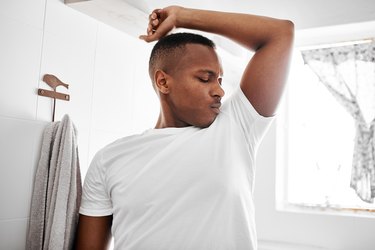
Showers are supposed to leave your underarms (and the rest of you) smelling fresh and clean. So if your armpits still smell after a shower, what's going on?
"When somebody feels like they're still smelly after the shower, typically it's someone who is more prone to sweating, and may have a buildup of bacteria on the skin in conjunction with the sweat," Marisa Garshick, MD, assistant clinical professor of dermatology at Cornell-New York Presbyterian Medical Center, tells LIVESTRONG.com.
Video of the Day
Video of the Day
Getting to the root of the problem is the simplest path to banishing that underarm odor for good. Here are the common causes of armpits that smell after showering and what you can do to get rid of the stench.
What Causes Body Odor?
Body odor is the smell given off when your sweat mixes with the bacteria on your skin, according to the Mayo Clinic. (It's not your sweat that smells bad, in other words — sweat itself does not smell.)
There are two main types of sweat glands: eccrine and apocrine. Eccrine glands are found throughout your body; they release sweat to cool you down when you get too hot. Apocrine glands, on the other hand, are found in hairy areas (think: underarms, groin), and they release a milky fluid when you're stressed. Sweat from your apocrine glands can smell especially bad when it mixes with your skin bacteria.
1. Antiperspirant Mistakes
Do you typically apply your antiperspirant after hopping out of the shower in the morning? That might seem like the most effective way to keep sweat and underarm odor at bay, but in fact, it's not. "Antiperspirants are most effective when used at bedtime," Dr. Garshick says.
Here's why: Antiperspirants work by plugging up underarm sweat glands to prevent sweat from being released. "Because sweat glands are empty at night, they can take up more of that antiperspirant," Dr. Garshick explains.
And because most antiperspirants are designed to work for 24 hours, they'll continue working to keep sweat at bay even after you've showered the next morning. (Though if you'd feel more protected with an extra swipe in the a.m., go for it. Just make sure your skin is completely dry first.)
Make sure, too, that you're using a true antiperspirant rather than a deodorant, which masks odor but doesn't actually stop sweat. If you use the latter, though, you might wonder: Should I not put deodorant on after a shower? The answer is no. Deodorant works differently from antiperspirant, so you should apply deodorant after a shower to help prevent body odor.
Fix It
Shake up your routine and switch to applying your antiperspirant at night if your armpits still smell after your morning shower.
If you're a heavy sweater and your standard antiperspirant doesn't seem to be cutting it, Dr. Garshick recommends trying an extra-potent option like CertainDri Prescription Strength Clinical ($5.67, Amazon).
2. Armpit Hair
Underarm hair traps more sweat than skin alone, so the sweat has more time to mix with stink-causing bacteria, says Beth Goldstein, MD, adjunct clinical professor of dermatology at the University of North Carolina at Chapel Hill and founder of the skin-care brand GETMR.
Hair-covered skin can also be tougher to get squeaky clean, so you might notice your pits are still smelly even though you shower regularly.
Fix It
If you've got a lot of fuzz and are struggling with odor after a shower, consider shaving or waxing. One March 2016 study in the Journal of Cosmetic Dermatology found removing underarm hair was effective at minimizing armpit odor.
3. Bacteria Buildup
Showering should get rid of that armpit smell, but if it doesn't, you might be dealing with stubborn bacteria.
We all have a mix of "good" and "bad" bacteria living on the surface of our skin, including the skin in our armpits. "Usually these bacteria are in a balanced state. But occasionally that balance can become disrupted and cause an overgrowth of certain 'bad' bacteria," Dr. Garshick explains. And that can make body odor worse or more intense, even if you're cleaning your pits daily.
Fix It
Fortunately, getting rid of the stink is often as easy as switching up your body wash or soap. When it comes to the best soap for underarm odor, Dr. Goldstein recommends an antibacterial wash like Dial Complete White Antibacterial Bar Soap ($13.33 for 6 bars, Amazon) or Hibiclens Antiseptic & Antimicrobial Skin Cleanser ($36.40 for 2 bottles, Amazon). "Use it daily or twice daily, without scrubbing," she says.
Also, wear moisture-wicking clothing and dry off your armpits completely after showering. Bacteria thrive in warm, damp environments like your still-wet and sweaty underarms, according to the Mayo Clinic, so do your best to make your pits less hospitable.
4. Diet Habits
Yep, certain foods can cause stinky body odor that lingers (or even armpits that smell like onions), despite your good hygiene. The most common culprits behind bad body odor include the following, per the Cleveland Clinic:
- Cruciferous veggies like broccoli, cabbage and cauliflower
- Garlic
- Onions
- Red meat
- Spices like cumin or curry
- Spicy foods
- Alcohol
- Caffeine
Fix It
If you notice a pungent odor after eating a certain food (including after a shower), try avoiding that food to get rid of the B.O., per the Cleveland Clinic. If you don't want to eliminate it entirely, try eating it in smaller portions to see if that reduces the smell.
5. Medication Side Effects
Started a new prescription recently? If it seems like you're sweating — and smelling — more than usual, even after a shower, the medication might be to blame.
The following drugs have the potential to cause hyperhidrosis, or excessive sweating that can potentially make your body odor more noticeable, according to a January 2013 review in Drug Safety:
- Cholinesterase inhibitors such as Aricept, Razadyne and Exelon, used to treat Alzheimer's and dementia
- Selective serotonin reuptake inhibitors (SSRIs) like Zoloft, Prozac and Lexapro, used to treat depression and anxiety
- Opioids like Vicodin, Percocet and OxyContin, used to treat pain
- Tricyclic antidepressants such as Norpramin, Elavil and Pamelor, used to treat conditions including depression and OCD
Fix It
Talk with your doctor about your sudden increase in body odor and your prescriptions. In some cases, you may be able to try a lower dose or switch to a different medication. If not, switching to one of the best deodorants or a prescription-strength antiperspirant might also be helpful.
6. Skin Infections
A pimple-like or pus-filled spot in your underarm can often be an odor culprit, especially if you notice that just one armpit smells after showering.
"We have all these little hair follicles in the armpit, and when people shave, there are lots of little portals of entry for potentially problematic bacteria to enter and cause what looks like an ingrown hair," Dr. Garshick explains. "But if it's filled with pus, it could be an infection."
Fix It
Allowing the ingrown hair to heal will help get rid of the smell. Stopping shaving until the spot clears up might be enough to do the trick, according to the Mayo Clinic. But in some cases, your doctor may need to prescribe a steroid or antibiotic cream to help you fight off the infection.
7. Underlying Medical Conditions
Certain conditions or diseases can cause bad body odor, or a change in body odor, regardless of how well you wash off in the shower according to the Cleveland Clinic. These include:
- Diabetes (often causes fruity or sweet-smelling sweat)
- Menopause
- Hyperthyroidism
- Gout
- Kidney disease
- Liver disease
- Some infectious diseases, such as viral or bacterial infections
Some of these conditions, such as menopause and hyperthyroidism, can cause increased sweating, which may cause you to smell bad even with good hygiene. In other cases, the odor can signal that something is off in your body. Kidney or liver disease, for example, can cause a bleach-like body odor because of a buildup of toxins in your body.
Fix It
If you suspect a medical condition is behind your smelly armpits, talk to your doctor, who can properly diagnose you and help you determine the best course of treatment.
When to See a Doctor About Body Odor
Occasionally being stinkier than usual despite showering regularly probably isn't cause for concern, especially if at-home measures like applying your antiperspirant correctly, shaving or washing with an antibacterial soap seem to solve the problem.
But if you consistently have smelly armpits after a shower, or the odor seems to be coming from other parts of your body as well, call your doctor. "These could be signs of a medical illness such as liver disease, diabetes or an inability to metabolize certain foods or medications," Dr. Goldstein says.
- Journal of Cosmetic Dermatology: "A comparative clinical study of different hair removal procedures and their impact on axillary odor reduction in men"
- Drug Safety: "Drug-Induced Hyperhidrosis and Hypohidrosis"
- Mayo Clinic: "Ingrown Hair"
- Cleveland Clinic: "Causes, Changes, Underlying Diseases & Treatment"
- Mayo Clinic: "Sweating and Body Odor"
Is this an emergency? If you are experiencing serious medical symptoms, please see the National Library of Medicine’s list of signs you need emergency medical attention or call 911.


